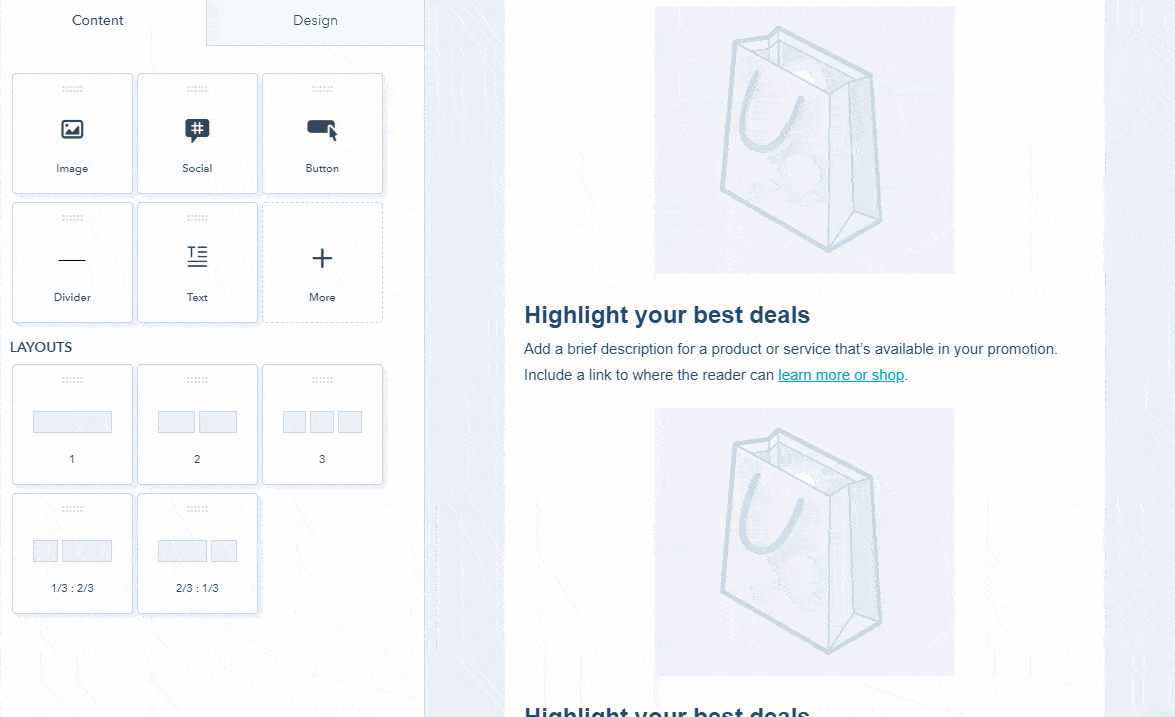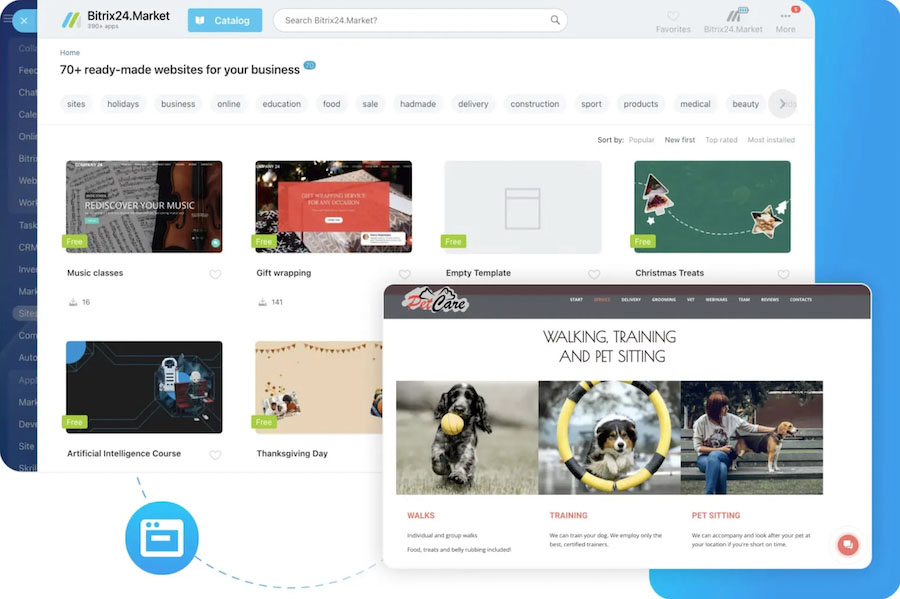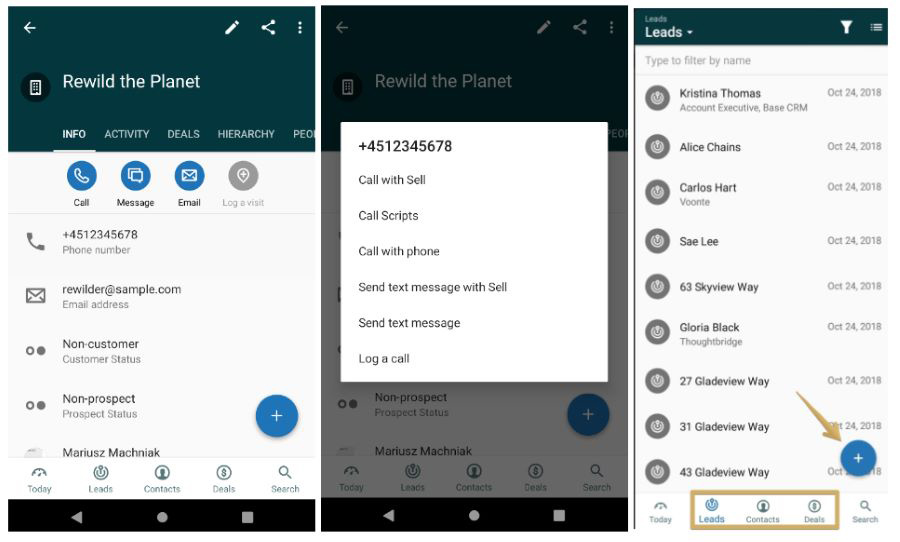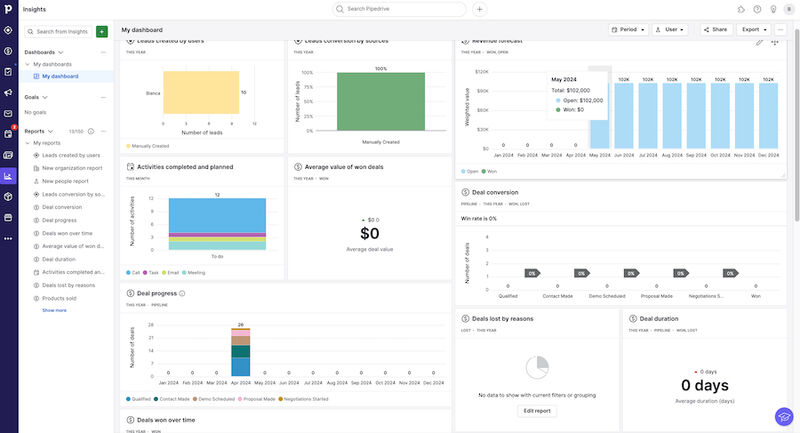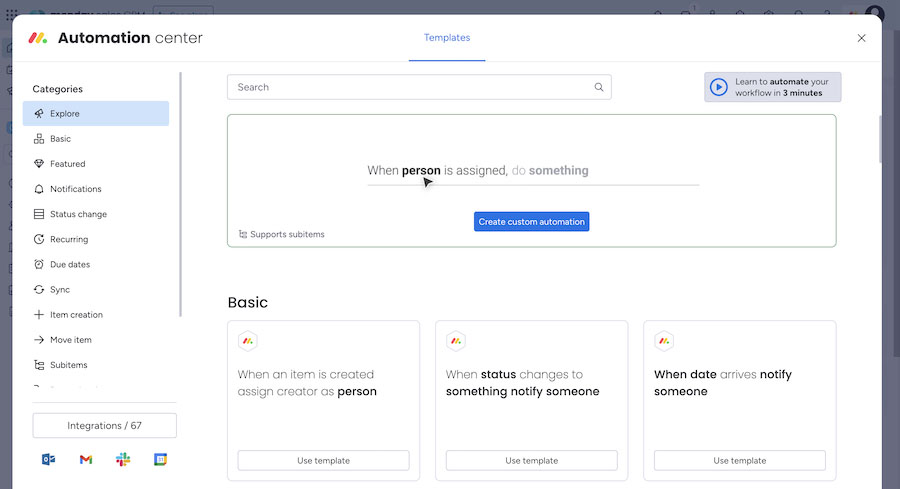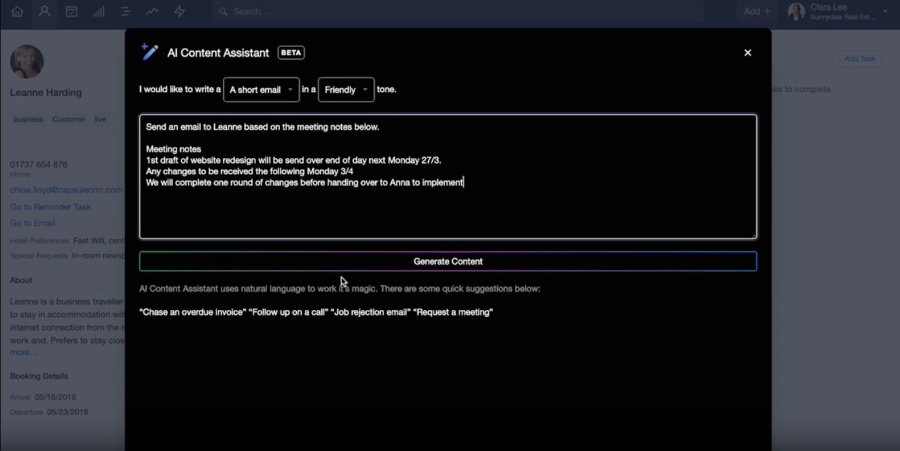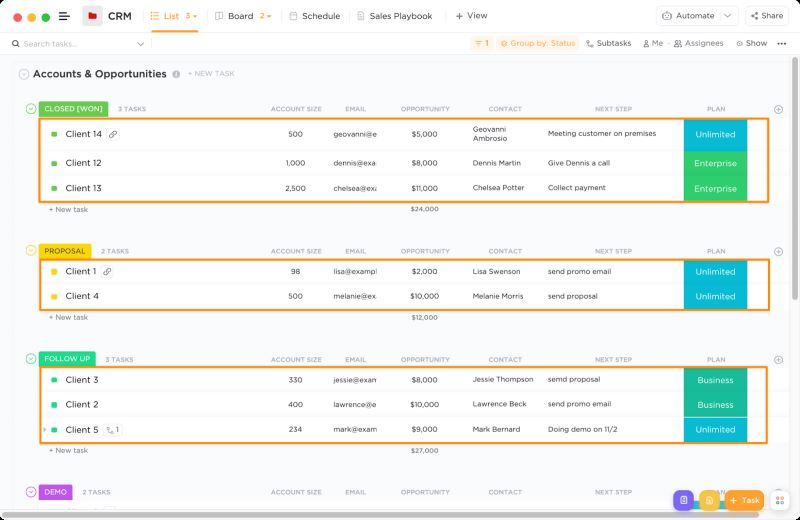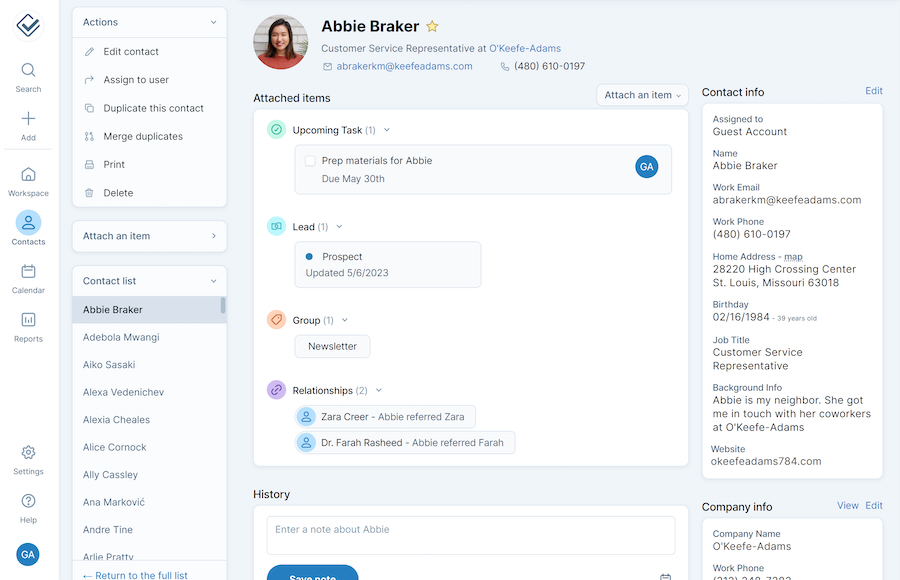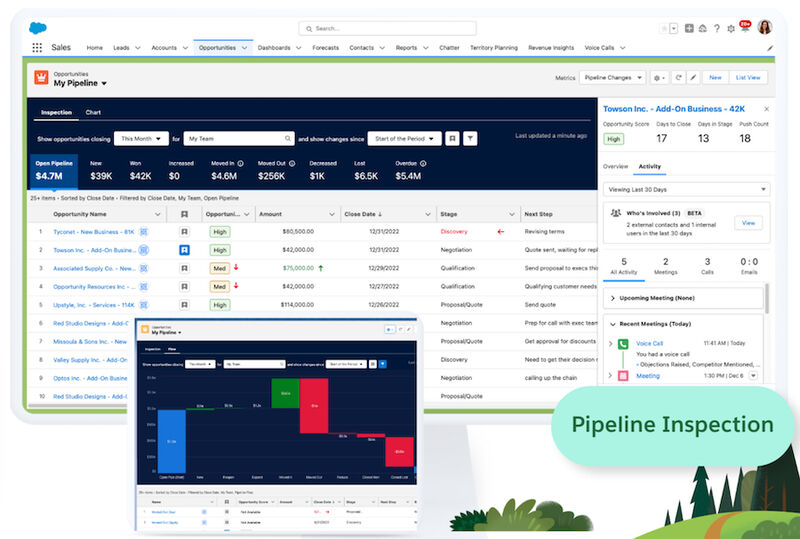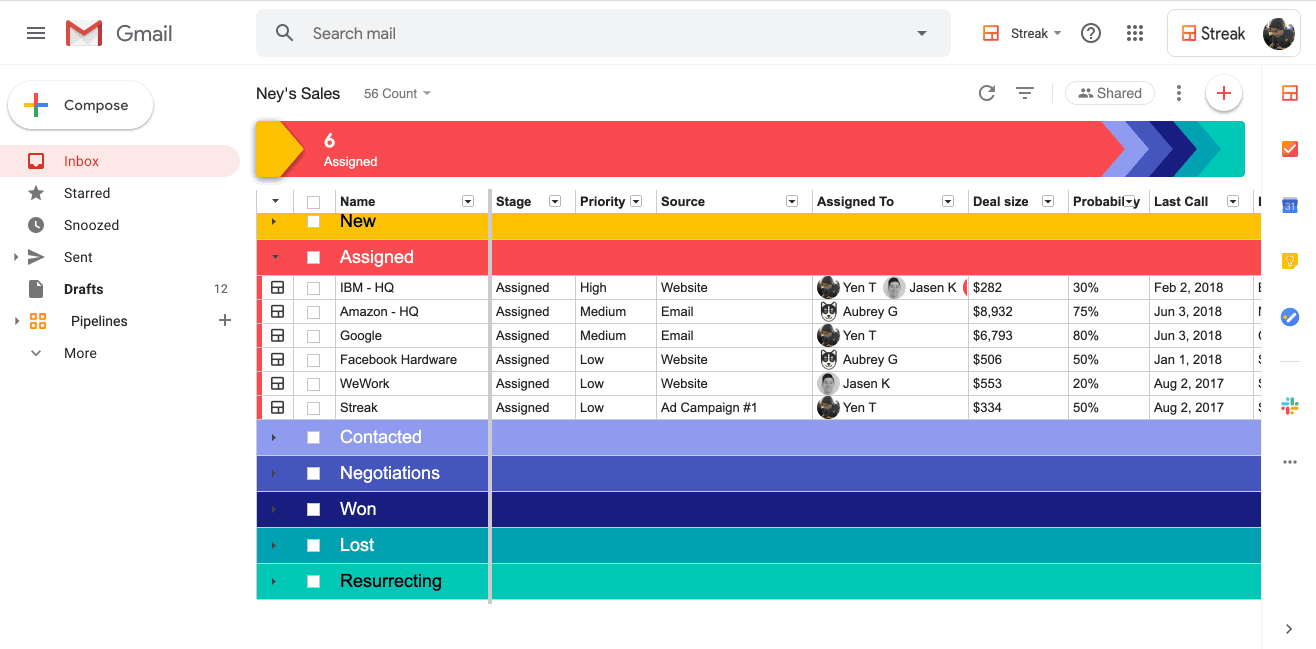Zoho’s customer relationship management (CRM) software is an excellent solution for low-cost sales automation, robust system customization, and monitoring social media profiles. It also offers a wide range of native and third-party integration options to expand your CRM’s capabilities. However, if you need a more intuitive platform interface or free mass email tools, some of the Zoho alternatives are a better fit.
After evaluating dozens of CRM providers, we’ve identified the 10 best Zoho competitors:
- HubSpot CRM: Best overall for advanced marketing
- Bitrix24: Best for ecommerce businesses
- Zendesk Sell: Best for hybrid sales teams
- Pipedrive: Best for AI sales management
- monday CRM: Best for workflow automation
- Capsule CRM: Best for AI sales emails
- ClickUp: Best for operations management
- Less Annoying CRM: Best for ease of use
- Salesforce: Best for business health reporting
- Streak CRM: Best for Google Workspace users
Read our in-depth expert review of Zoho CRM to know more about this platform and to get a clearer point of comparison against its competitors.
Best Zoho Alternatives Compared
Provider | Free Plan/Trial | Our Rating out of 5 | |
|---|---|---|---|
 | ✔ 3 users | $14 per user | 4.29 |
 | ✔ 5 users | $15 per user | 4.67 |
 | ✔ Unlimited users | $49 for 5 users | 4.55 |
 | ✕ 14-day free trial | $19 per user | 4.54 |
 | ✕ 14-day free trial
| $14 per user | 4.44 |
 | ✕ 14-day free trial
| 4.33 | |
 | ✔ 2 users
| $18 per user | 4.27 |
 | ✔ Unlimited users
| $7 per user | 4.12 |
 | ✕ 30-day free trial | $15 per user | 4.07 |
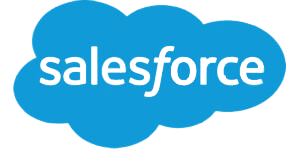 | ✕ 30-day free trial
| $25 per user | 4.03 |
 | ✔ One user
| $49 per user | 4.01 |
HubSpot CRM: Overall Best Zoho Alternative for Advanced Marketing

Pros
- Includes free marketing tools, such as a template library, email tracking, and list segmentation capabilities
- Has free and robust all-in-one CRM system with sales, marketing, service, content, operations, and ecommerce tools
- Offers special features such as an AI content generator, ad management, and invoicing at no cost
Cons
- Doesn’t include automation and conversation routing in the Free plan
- Doesn’t include lead scoring and forecasting until the Professional tier ($90 per user monthly)
- Lacks sales territory management capabilities
When to Use HubSpot CRM Over Zoho CRM
- You want more advanced marketing tools: HubSpot CRM and Zoho CRM are among the best CRMs for email marketing. However, HubSpot CRM is better because it offers automated email campaigns, Google and social media ad management, list segmentation, and landing page design tools. Users can also create and upload lead-generation web forms, manage blogs, and host an on-demand video library.
- You function in a revenue operations (RevOps) structure: Similar to Zoho CRM, HubSpot’s Customer Platform is a bundled product consisting of sales, marketing, and customer service modules. This makes it a great option for overseeing revenue teams that operate under one unified umbrella. Its all-in-one capabilities helped propel it to the top spot among the best small business CRMs.
- You want a free CRM with AI tools: HubSpot CRM is one of the best AI CRMs because its free plan comes with user-friendly AI tools. It has an AI content assistant for blogs, a ChatBot builder, and a ChatSpot tool that allows users to type in commands for tasks, including sending email follow-ups and generating reports. Zoho CRM’s AI tools do not come in until the Enterprise plan ($52 per user monthly).
HubSpot CRM Pricing Plans*
*Pricing is based on annual billing on a per-month breakdown of the HubSpot Sales Hub plans. Monthly billing and enterprise-level options are available for a higher cost. While we update pricing information regularly, we encourage our readers to check current pricing.
**The Customer Platform includes sales, marketing, service, content, operations, and commerce management tools bundled into one product.
Create marketing emails using the drag-and-drop email editor. (Source: HubSpot)
Our Expert Opinion
Both HubSpot CRM and Zoho CRM offer a free plan and features for mass email campaigns, social media monitoring, and qualifying leads through scoring. However, HubSpot CRM extends those capabilities with ad management for social media and online ads, content creation tools, blog and video hosting, and search engine optimization (SEO) recommendations. Plus, it offers a much more robust free plan with easy-to-use tools for RevOps and AI chatbots.
Bitrix24: Best for Ecommerce Businesses

Pros
- Offers unlimited user allocation and robust ecommerce features in the Free plan
- Has AI-powered Contact Center for omnichannel customer engagement via email, phone, live chat, and social media
- Has specialized modules for project management, human resources, and website and landing page development
Cons
- Has sharp learning curve for operating and navigating the interface because of robust and advanced features
- Doesn’t include lead management, segment-based marketing, and project management features until the Standard plan ($99 per month for 50 users)
- Lacks webmail integration and telephonic capabilities in the free plan
When to Use Bitrix24 Over Zoho CRM
- You need a top ecommerce CRM to manage your online store: Zoho CRM has an inventory management module with its Enterprise plan ($40 per user monthly). However, it offers limited CRM features for managing ecommerce businesses. Bitrix24, on the other hand, has robust ecommerce with its free plan. It includes an online store builder, payment processing, coupons, and a shipping cost calculator.
- You want to leverage free AI tools for customer engagement: Bitrix24’s free plan comes with an AI-powered assistant called CoPilot. It transcribes call recordings, summarizes call and email threads, autocompletes fields, composes emails, and responds to chats based on preset roles. Zia AI, Zoho CRM’s counterpart for CoPilot, is locked in with the Enterprise plan ($52 per user monthly).
Bitrix24 Pricing Plans*
Bitrix24 Pricing Add-ons
- Landline calling: Starts at $0.004 per minute
- Rent local number: $4.00 to $11.00 per month
- Rent toll-free number: $6.00 per month
- Rent SIP (session-initiated protocol) connector: $49 per month
- Call transcription: 5 cents per minute
*Pricing is based on annual billing on a per-month breakdown of the plans. Monthly billing and enterprise-level options are available for a higher cost. While we update pricing information regularly, we encourage our readers to check current pricing.
Online store created using a Bitrix24 template (Source: Bitrix24)
Our Expert Opinion
Bitrix24 fills in the gap if you’re looking for Zoho competitors that offer comprehensive ecommerce features and AI tools at no cost. It allows you to create an online store using prebuilt templates, process payments, implement discount coupons, and automatically calculate shipping costs. You can also leverage its Bitrix24 CoPilot AI tool to process calls and automate repetitive tasks, such as writing emails and autocompleting lead and deal fields.
Zendesk Sell: Best for Managing Hybrid Sales Teams

Pros
- Has a robust yet intuitive mobile app with geolocation and a centralized dashboard for monitoring KPIs
- Offers excellent text messaging and call features in the mobile app
- Has advanced customer service analytics and reporting tools
Cons
- Doesn’t have a free plan, just a 14-day free trial
- Doesn’t include sales forecasting and goal tracking until the Sell Growth plan ($55 per user monthly)
- Only offers automations and lead scoring in the Sell Professional plan ($115 per user monthly)
When to Use Zendesk Sell Over Zoho CRM
- You need an intuitive mobile CRM to manage your field sales team: Zendesk Sell offers a robust yet intuitive mobile app across all plans. You can monitor your sales team’s KPIs on the go from a centralized dashboard and track their client visits using its geolocation feature. In comparison, Zoho CRM’s mobile app has a steep learning curve because of its advanced features like mobile card scanners and sales analytics.
- Your field sales team requires a CRM with text messaging and calling features: Field sales reps can leverage Zendesk Sell’s text messaging and call features to easily get in touch with prospects, leads, and customers on the go. All plans (starting at $19 per user monthly) allow you to track, record, and automatically log calls. Zoho CRM’s telephonic features are locked with its Enterprise plan ($40 per user monthly).
Zendesk Sell Pricing Plans*
*Pricing is based on annual billing on a per-month breakdown of the plans. Monthly billing and enterprise-level options are available for a higher cost. It comes with a 14-day free trial. While we update pricing information regularly, we encourage our readers to check current pricing.
Zendesk Sell for Android (Source: Zendesk Sell)
Our Expert Opinion
Zendesk Sell’s intuitive mobile app, KPI dashboard, and telephonic capabilities make it one of the most ideal alternatives to Zoho CRM for sales teams deployed in the field. Sales team managers can easily track their activities and locations using the mobile app. Field sales reps, on the other hand, can find nearby prospects and log their client visits. Plus, they can communicate with customers via text messages and phone calls directly from the CRM.
Pipedrive: Best for AI-powered Sales Productivity Management

Pros
- Has relatively low-cost plans (starting at $14 per user monthly) with AI tools for analytics and performance recommendations
- Offers end-to-end lead generation, deal management, and proposal creation capabilities
- Offers great operations CRM for boosting productivity and facilitating team and deal collaboration
Cons
- Has no free plan, just a 14-day free trial
- Only includes workflow automation and email tools in the Advanced plan ($34 per user monthly)
- Lacks AI capabilities for content creation
When to Use Pipedrive Over Zoho CRM
- You need more cost-friendly AI options: Pipedrive has extremely cost-friendly AI capabilities that start at $14 per user monthly, relative to Zoho CRM’s Enterprise plan ($40 per user monthly). Pipedrive’s Sales Assistant tool enables teams to discover new ways to improve sales performance, productivity, and priority tasks by analyzing user behaviors and CRM records like leads, deals, and activity.
- You want a robust lead management tool: Pipedrive is a more sophisticated lead and deal management tool than Zoho CRM, making it one of the best lead management software. Smart Docs, for instance, autopopulates stored CRM data onto proposals to easily create and send. Its Smart Contact Data autoupdates lead profiles with online information. Users can also get detailed reports on deals lost.
Pipedrive Pricing Plans*
Pipedrive Pricing Add-ons:
- LeadBooster Lead generation tool set includes chatbots, live chat engagement, prospecting tools, web forms, and a meeting scheduler. : Starting at $32.50 per company monthly
- Web Visitors Tracking Web tracking and lead ranking. : Starting at $41 per company monthly
- Campaigns Customizable email campaigns. : Starting at $13.33 per company monthly
- Smart Docs Send trackable quotes, proposals, and contracts; free with Professional or Enterprise plan subscription. : Starting at $32.50 per company monthly
- Projects Project and task management. : Starting at $6.70 per user monthly
*Pricing is based on annual billing on a per-month breakdown of the plans. Monthly billing is available for a higher cost. Pipedrive offers a 14-day free trial. While we update pricing information regularly, we encourage our readers to check current pricing.
Pipedrive dashboard and reports (Source: Pipedrive free trial)
Our Expert Opinion
Relative to Zoho CRM, Pipedrive’s AI tools are more affordable, starting at $14 per user monthly. All plans come with a sales assistant that provides you with smart recommendations for marketplace app search and for improving productivity. Plus, it is equipped with end-to-end lead management capabilities that include deal management and business proposal creation with automatic lead and deal data enrichment.
monday CRM: Best for Workflow Process Automation

Pros
- Is highly intuitive to operate and leverages low-code design for custom automations
- Has unlimited boards for managing projects, clients, work, tasks, and data
- Offers sales ops management features for rep capacity planning, onboarding, and sales material storage
Cons
- Has no free plan (just a 14-day free trial) and misleading cost of paid plans with a three-user minimum requirement
- Only includes email automation and sales forecasting features in the Pro CRM plan ($28 per user, monthly)
- Requires a custom-priced Enterprise plan to include lead scoring and team goal tracking
When to Use monday CRM Over Zoho CRM
- You need a highly customizable CRM with intuitive customization tools: Despite its high customizability, monday CRM users can easily build custom workflow automations, thanks to its no-code design. This is why it’s included in our list of the best customizable CRMs. Zoho CRM, on the other hand, has a higher learning curve because of its robust and deep customization capabilities.
- You want a CRM with built-in project collaboration features: monday CRM has drag-and-drop workboards and digital whiteboards that you can use for updating and collaborating on unlimited projects and tasks. Meanwhile, Zoho CRM leverages its native integration with Zoho Projects for this. However, the free plan is limited to two projects with subtasks.
monday CRM Pricing Plans*
*Pricing is based on annual billing on a per-month breakdown. Monthly billing is available for a higher cost. It comes with a 14-day free trial. While we update pricing information regularly, we encourage our readers to check current pricing.
monday CRM automation center with workflow automation templates (Source: monday CRM free trial)
Our Expert Opinion
monday CRM is on par with Zoho CRM when it comes to customizability, but its no-code design makes it a lot easier to create custom automations. In addition, you can create and manage an unlimited number of projects, clients, work, tasks, and data using its drag-and-drop workboard. Moreover, it offers sales operations management features, such as headcount planning, sales team onboarding, sales collateral storage, and sales document library.
Capsule CRM: Best for Generating AI Sales Emails

Pros
- Includes AI Content Assistant in the Free plan, helping craft and optimize sales emails
- Has built-in project and task management
- Allows easy integration with accounting apps like Xero and QuickBooks
Cons
- Doesn’t have accounting integrations in the Free plan and is limited to 250 contacts, basic dashboards, and email tools
- Doesn’t include workflow automation features until the Growth plan at $36 per user, monthly
- Lacks ecommerce features like inventory management, a website designer, and purchase order processing
When to Use Capsule CRM Over Zoho CRM
- You want to leverage AI for writing sales emails: All of Capsule CRM’s plans include access to its AI content assistant. This tool helps you draft sales emails from a contact record and provides recommendations on the tone, topic, and length of your email message. This capability is not part of Zoho CRM’s intelligent sales assistant Zia, which is mostly for automation and analytics.
- You’re seeking free built-in tools for managing projects and tasks: Zoho CRM relies on its native integration with Zoho Projects for its project and task management capabilities. Capsule CRM, on the other hand, offers project management features with unlimited tasks with its free plan.
Capsule CRM Pricing Plans*
Capsule CRM Pricing Add-on:
- Transpond (marketing automation tools): Starts at $11 per user, monthly
*Pricing is based on annual billing on a per-month breakdown of the plans. Paid plans come with a 14-day free trial. While we update pricing information regularly, we encourage our readers to check current pricing.
Capsule CRM’s AI-powered sales email content assistant (Source: Capsule CRM)
Our Expert Opinion
When it comes to AI tools, Zoho CRM’s Zia for analytics and automation tool is much more advanced. However, it does not possess the email content creation capabilities that Capsule CRM has. Another edge that Capsule CRM has is its built-in project and task management features. You can create, assign, and automate tasks, receive daily task reminder emails, and design an unlimited number of task sequences to manage your work processes.
ClickUp: Best for Operations Management

Pros
- Has a complete work and operations management system with highly customizable workflows, views, and dashboards
- Has more than 15 project view options, including Gantt charts and mind maps
- Supports unlimited users, unlimited tasks, custom views, and reporting capabilities in the Free plan
Cons
- Is not a traditional CRM system (users must customize their boards to meet their needs)
- Has a steep learning curve because of high customizability
- Limits the Free plan to five workspaces and 100MB of file storage
When to Use ClickUp Over Zoho CRM
- You need a fully equipped work and operations management platform: Starting with the free plan, ClickUp offers a robust set of productivity tools. These include work management templates, dashboards, automations, task checklists, time tracking, and file sharing. While Zoho CRM is one of the best operational CRMs with workflows, task management, and automations that are free, it is not a standard work management system.
- You want a CRM alternative with various data view options: ClickUp is one of the top CRM alternatives that offers multiple data viewing options. You can customize your workboards according to your unique business needs and choose a custom project view to display boards, calendars, boards, workloads, and mind maps.
ClickUp Pricing Plans*
ClickUp Pricing Add-ons:
- ClickUp AI: Starts at $7 per user, monthly
- Automations: Starts at $19.99 per month for 1,000 monthly automations
- Email Account: $2 per user or $24 per year for each additional email account
*Pricing is based on annual billing on a per-month breakdown of the plans. Monthly billing is available for a higher cost. While we update pricing information regularly, we encourage our readers to check current pricing.
ClickUp CRM template with preloaded client task information (Source: ClickUp)
Our Expert Opinion
ClickUp is one of the best Zoho CRM alternatives if you’re looking for a highly customizable work and operations management solution. You can use its work boards, templates, and automations to streamline your day-to-day business operations. You can also choose from 15 different project viewing options to customize the data visible on your dashboard. However, ClickUp is not a traditional CRM, so it requires some adjustments to use it as a CRM.
Less Annoying CRM: Best for Ease of Use

Pros
- Has an easy-to-use interface and straightforward tools for managing contacts and tasks
- Has prebuilt and custom pipeline templates for various use cases, including projects, orders, and expense tracking
- Offers unlimited contacts, companies, custom fields, and pipelines
Cons
- Has no native mobile app, just a mobile-friendly web app
- Lacks advanced features, such as AI analytics, click-to-call capabilities, lead routing, and automated campaigns
- Has no free plan (single pricing plan makes it challenging for growing businesses to scale)
When to Use Less Annoying CRM Over Zoho CRM
- You need a no-frills CRM for contact and task management: As its name implies, Less Annoying CRM is simple and intuitive, making it easy to operate for all types of users. Its single pricing tier also makes the subscription process a lot simpler. Zoho CRM, on the other hand, has a steep learning curve because of its high customizability, robust features, and advanced capabilities.
- You want a basic CRM with built-in project management capabilities: Less Annoying CRM has customizable pipelines and a prebuilt pipeline template that you can use for managing client projects. You can tailor your work processes for specific projects, track your invoices, and link a project to a contact record. Zoho CRM, on the other hand, relies on its native integration with Zoho Projects for this function.
Less Annoying CRM Pricing Plan*
Less Annoying CRM
Cost: $15 per user
Key Features:
- Unlimited contacts and companies
- Unlimited pipelines and custom fields
- Customizable pipeline templates for project and order management
- 25GB file storage
- Lead pipeline management with stage tracking
- Shared calendar
- Task management
- Email logging
- Activity and lead reports
- User permissions
*Pricing is based on monthly billing. A custom-priced enterprise-level plan is also available for organizations needing more than 10 users. While we update pricing information regularly, we encourage our readers to check current pricing.
Less Annoying CRM contact record (Source: Less Annoying CRM)
Our Expert Opinion
If you’re looking for a basic alternative to Zoho CRM, Less Annoying CRM is a great option. Its simple layout, intuitive interface, and single pricing tier make it a hassle-free solution. The main dashboard displays a search bar and a contact list. Each contact record contains related tasks, projects, and deals. Despite its simplicity, it comes out of the box with prebuilt and customizable pipeline templates that you can use for project management and expense tracking.
Salesforce: Best for Business Health Reporting

Pros
- Has customizable reports and dashboards that show real-time views of business health with advanced filtering
- Offers integrated tools for sales, email outreach, customer service, and commerce in one platform
- Has an intuitive mobile app that offers all features in the desktop app
Cons
- Has no free plan, only a 30-day free trial
- Has a sharp learning curve because of robust and advanced features
- Only includes forecast and quote management tools in the Pro Suite plan ($100 per user, monthly)
When to Use Salesforce Over Zoho CRM
- You need a CRM with more sophisticated business reporting tools: Both Zoho CRM and Salesforce offer advanced sales activity and performance reporting tools. However, Zoho CRM’s Zia AI tool is limited to certain KPIs and funnel metrics. Salesforce’s Einstein AI tool, on the other hand, has a wider reporting range that includes mobile forecasting, territory dividing, deal scoring, and trend insights.
- You want an all-in-one CRM with ecommerce tools: Zoho CRM and Salesforce are both formidable brands that offer sales, marketing, and customer service management features in one platform. However, while Zoho CRM’s ecommerce tools are mostly focused on inventory management, Salesforce gains the advantage over it by offering a commerce module with payment processing capabilities.
Salesforce Pricing Plans*
Salesforce Pricing Add-ons:
- Marketing Email Sends: $10 per 1,000 monthly email sends
- Web Services API Integrate with external apps using REST, SOAP, Bulk, and Streaming APIs; for Pro Suite plan. : $25 per user, monthly
- Premier Success Plan Additional expert help, adoption, guidance, coaching, and live support; for Pro Suite plan. : 30% of net license price
*Pricing is based on annual billing on a per-month breakdown of Salesforce Sales Cloud’s solutions for SMBs. Monthly billing for the Starter Suite is available for a higher cost. It comes with a 30-day free trial. While we update pricing information regularly, we encourage our readers to check current pricing.
Salesforce Pipeline Command Center with key metrics, visual cues, and insights (Source: G2)
Our Expert Opinion
Salesforce and Zoho CRM are both winners when it comes to customizability, advanced features, and scalability. However, Salesforce gains an edge by offering more sophisticated AI-powered reporting capabilities. It also fills in the gap for ecommerce functions, such as creating payment portals and direct payment links for deals. Moreover, its mobile app is a lot more intuitive than Zoho CRM and includes everything that is in the desktop version.
Streak CRM: Best for Google Workspace Users

Pros
- Offers a Chrome extension and direct integration with Google Workspace apps
- Has a unique format as a CRM plugged into Gmail to manage contacts and pipelines on the Gmail interface
- Is customizable for users to track any business processes or pipelines they wish
Cons
- Can be difficult for users to get used to interface design within the Gmail inbox
- Only includes non-Google integrations, automated workflows, and AI tools in the Pro+ plan ($69 per user, monthly)
- Supports only one user in the Free plan and no longer includes core CRM features—only email power tools
When to Use Streak CRM Over Zoho CRM
- Your team uses Google Workspace for collaboration and productivity: Streak CRM is one of the best Google CRMs on the market, given that it directly integrates with Google Workspace apps, including Calendar, Drive, and Chat. Zoho CRM, on the other hand, is limited to data sync with Google apps and Google Sites integration for lead generation.
- You want a basic CRM for managing contacts and deals: Zoho CRM offers a comprehensive and advanced set of features for sales and marketing automation. Meanwhile, Streak CRM stands out for its simplicity, ease of use, and the familiar layout of Google. Its Chrome extension allows you to access your CRM within your Gmail inbox for seamless contact and deal management.
Streak CRM Pricing Plans*
*Pricing is based on annual billing on a per-month breakdown of the plans. Monthly billing is available for a higher cost. Paid plans come with a 14-day free trial. While we update pricing information regularly, we encourage our readers to check current pricing.
Streak CRM lets you customize sales pipelines on Gmail. (Source: Streak CRM)
Our Expert Opinion
Streak CRM is a true Google CRM that allows you to track and manage deals without leaving your Gmail inbox, as it is uniquely formatted as a Chrome extension built inside Gmail. While Zoho CRM has limited Google integration capabilities, Streak CRM directly integrates with all Google Workspace apps. You can also customize it to tailor your pipelines according to your unique business process, but it still manages to retain its simplicity and ease of use.
How We Evaluated the Best Zoho Competitors
To determine the best Zoho alternatives, we evaluated the specific product features that either match the CRM’s highly acclaimed attributes or supplement something it is missing. For instance, users love Zoho CRM’s low prices and its AI tools for insights and analytics but find its interface challenging to master. We also looked at other critical product attributes like customer support availability and what users say about it to know how to choose the right CRM.
The tabs below offer insight into our evaluation process of the best Zoho competitors:
25% of Overall Score
General features refer to baseline capabilities we expect each CRM to provide to help a small business get value from its software. Robust system customization, for example, lets a team tailor their product to meet their unique operational needs. We also wanted the provider to offer a mobile CRM app for on-the-go sales, a wide range of integration options to extend the CRM’s functionality, and solid reporting and analytics tools.
20% of Overall Score
This criterion looked at advanced features that give a CRM provider a slight boost and stronger capabilities, but aren’t always a given in CRM software. Sophisticated marketing automation, for instance, allows you to create and deploy email, advertising, and social media campaigns to mass audiences. We also examined whether a provider offers built-in AI, revenue forecasting, and pipeline analytics features.
15% of Overall Score
Since small businesses are usually on a tight budget, pricing was an important evaluation factor. This considered the availability of a free-forever plan and affordable pricing options that are cost-friendly and scalable for growing businesses. Finally, we looked at options for subscribers to pay monthly or save by paying annually.
15% of Overall Score
In addition to firsthand experience with these CRM systems for small businesses, we looked into what actual users say about each provider according to online reviews from trusted sites. This category helps us better understand how users feel about the product’s features, platform ease of use, and value customers feel the gain from each CRM.
15% of Overall Score
Excellent customer support helps prevent poor user experiences or technical issues a small business may encounter while using any of these CRMs. This was evaluated in terms of customer service hours and the availability of support through phone, live chat, and email. We also looked at self-service resources users can access, like knowledge base articles, tutorials, user forums, and FAQ pages.
10% of Overall Score
In addition to firsthand experience with these CRM systems for small businesses, we looked into what actual users say about each provider according to online reviews from trusted sites. This category helps us better understand how users feel about the product’s features, platform ease of use, and value customers feel the gain from each CRM.
Frequently Asked Questions (FAQs)
A Zoho alternative or competitor is any CRM provider that can rival Zoho’s product attributes—making them ideal substitutions. To qualify, Zoho CRM competitors must match some of Zoho’s low pricing and highly acclaimed features, such as workflow automation and sales analytics. They must also be able to fill in a feature or user experience gap, or some combination of both.
We ranked HubSpot CRM as the best alternative to Zoho CRM because it matches Zoho’s pricing and excellent automation, AI, and account management features. Furthermore, HubSpot CRM fills in crucial product gaps like platform usability, advanced marketing tools, and AI content generation. Other CRM competitors like Bitrix24 could be better suited, however, if you’re looking for niche-specific, like ecommerce and project management.
The main disadvantages of Zoho CRM are its learning curve and complexity. It offers a robust set of features for managing sales, marketing, and customer service processes. Plus, it is a highly customizable CRM system. While these things are welcome for teams needing an all-in-one CRM, these could also be a deterrent for smaller teams wanting a simpler CRM without all the bells and whistles.
Bottom Line
A Zoho CRM alternative offers another product option to users looking to transition away from Zoho. It’ll give you some of the positive aspects of Zoho, like free plan availability, while filling in a product gap. Although HubSpot CRM is our pick for the best overall pick, other Zoho alternatives could offer better substitutions. For instance, Streak CRM is best for Gmail users, while Less Annoying CRM is best suited for those looking for a simple CRM.
